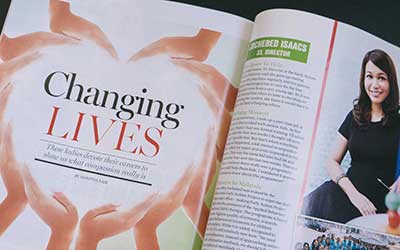
[Feature Article] Malaysian Women’s Weekly: Changing Lives
In the June edition of The Malaysian Women’s Weekly, our director, Jochebed Isaacs was featured in the Women Share segment called “Changing Lives”.
—
Changing Lives
Published in: The Malaysian Women’s Weekly
Published on: June
Written by: Jasnitha Nair

In a study conducted by a psychologist from University of Louisville in Kentucky, the research showed that the more people took part in meaningful activities, the more purposeful and happier their lives felt. So what is it about helping others that makes us happy?
A scientific research actually finds that helping others activates the exact same spot in our brains that’s stimulated by food!
Yet, how many of us do still go out of our way to help someone in need? The Weekly caught up with two ladies who’ve dedicated their whole careers to the sole purpose of helping someone in need. Their mantra? Changing people’s lives for the better.
The Desire To Help
Jochebed Isaacs, 33, Director at the Early Autism Project Malaysia said she grew up visiting homes for playdates regularly and her parents always encouraged her to care for the less fortunate even from a very young age. So it was only natural that when it came to deciding on pursuing her studies, she knew it would have to be in the field of helping others.
Defining Moment
“During university, I took up a part-time job at a centre that worked with autistic kids. At that point, I hadn’t had any formal training. I’ll admit that after the first two weeks, I though ‘oh wow, I can’t handle this.’ But that’s when something magical happened, a kid started to respond to me, called my name and even responded to his name. This was the same kid who had hit and puller my hair over the last two weeks. That was when I realised there really was a programme that could help these kids. I wondered if anyone in Malaysia knew about this programme?”
Pioneers in Malaysia
Soon after, Jochebed was trained by the Wisconsin Early Autism Project to supervise their Malaysian office – making Early Autism Project Malaysia the pioneers of the Applied Behavioural Analysis (ABA) therapy. The programme is based on the highest quality of intensive, research-based behavioural treatment for children with autism. While it is widely recognised in the US, it’s still relatively new here. “We need standardisation. Instead of approaching autism with alternative methods, we should follow international standards. Only then will families be protected. A lot of them only come to us after they’ve spent a huge sum of money and time on alternative methods.”
Timing Is Key
“There isn’t enough awareness on the importance of early identification of autism here. parents sometimes wait till their kid is five or six before bringing them in for a diagnosis. A child’s developmental milestones need to be observed in the first three years. Signs of autism start showing at 16 to 18 months. At five years old, it’s too late.”
The Kids Keep Her Going
“One of the kids that I’ve worked with the longest had really amazed me. John* went from only saying a few words when he was three to talking fluently now at 13! He’s progressed so much under the programme that I honestly believe that he’ll be able to go through formal education and finish university.
In fact, I don’t think he even meets the criteria of an autistic kid anymore. He’s really into sports and even all his coaches are wowed by his focus. I went from being his supervisor to his friendship coach.”